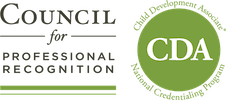Parents, early childhood educators and other adults share the responsibility to promote children’s physical, mental and oral health, as well as nutrition to fit their rapidly changing needs, body rhythms and individual abilities. These significant adults also need to help children learn self-help skills appropriate to their ages and cultures.
The Council for Professional Recognition promotes improved performance and recognition of professionals in the early childhood education of children ages birth to 5 years old and presents these tips and insights for parents and other responsible adults who participate in very young children’s lives. The Council offers the Child Development Associate® (CDA) Credential™ and has issued over 800,000 CDA credentials around the world.
Keep the following in mind when reading the tips:
- Infants need help to regulate their eating, sleeping and other experiences and activities gradually.
- Toddlers imitate and learn from the activities of those around them. Older people need to establish good health habits modeling and encouraging toothbrushing, hand washing, nutritious eating and clean up.
- Preschoolers are ready to learn reasons and take responsibility for good health practices such as bedtime, good nutrition, food preparation and toothbrushing.
But, as adults, our capacity to promote and ensure healthy habits in our home depends on our own health.
The COVID-19 Pandemic has presented us with new challenges. Many adults are home every day, and, in many cases, there are more people in your home right now. There are things parents can do to stay healthy in the home and make sure they eliminate the spreading of germs to young children and other family members.
Promote good health in the home.
Wash hands thoroughly with available soap and water before each diaper change and before each feeding. Teach and practice with children handwashing before eating and after toileting, and brushing teeth following proper hand washing sequence: wet hands, add liquid soap, wash for 20 seconds (or sing the Happy Birthday song twice), rinse, dry hands, and turn off water using paper towel.
Clean up and disinfect the children’s play areas and toys.
Surfaces like doorknobs and kitchen countertops, or the refrigerator door handle should be cleaned daily with a solution that has a high level of bleach, or at least 70% alcohol. The good news is most disinfectants in the store have this level of bleach or alcohol. Another way to make sure germs are not being spread in the home is to wear gloves when cleaning and if possible, dispose of the gloves every day.
Take care of your mental health, and the mental health of children.
This is a stressful time, but there are steps adults can take to remain mentally strong. Remember, adults are role models for children. How parents handle this stressful health crisis can affect how children manage their concerns. Research shows just being in the presence of a compassionate, safe adult can help children calm down. At home, try to be “that person” for them.
Adhere to a schedule.
That means getting up at the same time every day, taking a shower, getting dressed and eating on a regular schedule. It is also very important, with children at home, to maintain not only a sense of calm, but also a sense of control during this very uncertain and challenging time. A great idea is to wake up every morning and while still in bed think about three things to be grateful for and take five slow, deep breaths. It helps to keep the family engaged in fun and meaningful activities consistent with family and cultural values. Be sure to include young children as participants. For example, reading, watching movies, listening to music, playing games, exercising, or engaging in religious activities. Keep your children and family’s schedule consistent when it comes to bedtimes, meals, and exercise.
Be unconventional.
There are fun ways to break the routine of life, such as holding a picnic on the living room floor or setting up a tent by using the living room or kitchen table and covering it with large sheets. It is also fun to, dress up and dance like lions, elephants, monkeys, etc. Making time to cuddle with young children while reading books or looking at pictures is a simple and meaningful activity for the entire family. Fun is the goal not perfection.
Exercise alone and with children.
Maintaining physical activity during this time is important for everyone Exercise is transformational for the brain, cognition, focus and is known to be a mood booster. We also know exercise is great for the immune system and important for maintaining mental health. There are many dance and exercise videos available online through various platforms Dance to the songs your children love and introduce them to new ones. Be creative and try something new!
Prepare nutritious foods for snacks and meals and teach children to select and enjoy foods that are good and good for them.
Many grocery stores may be overcrowded, depleted of supplies or are far away from home, so stocking up on food as much as possible is a great idea. Maintaining a healthy diet right now is more important than ever. We encourage you to eat immune-boosting foods such as fruits and vegetables that are also high in antioxidants and foods that have omega-3 fatty acids such as fish. We also encourage freezing food and looking for frozen food options.
These are just a few tips to help maintain a healthy, safe and fun routine during this unprecedented time.
Additional Resources:
Understanding and Supporting the Emotional Needs of Young Children During the Pandemic
Tips for Parents: How to Continue Early Learning at Home
